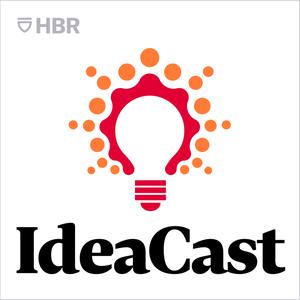
HBR IdeaCast
Harvard Business Review
From Harvard Business Review
- 25 minutes 1 secondTrying to Persuade and Other Big Mistakes Marketers MakeMany marketers today focus on getting consumers to consciously change their behavior. But that’s a sure path to failure, according to Leslie Zane, founder of Triggers Brand Consulting. She says neuroscience research shows that mastering instinct is far more effective than persuasion. And she shares her key lessons for aligning with the instinctive mind to improve company brands, new products, social campaigns, or your own personal brand. Zane is the author of the book The Power of Instinct: The New Rules of Persuasion in Business and Life.23 July 2024, 1:00 pm
- 29 minutes 52 secondsIs People-Pleasing Holding You Back?There's a fine line between pitching in to help your team and taking on too much at the expense of your mental health and performance. Author and coach Hailey Magee walks us through why some of us fall into people-pleasing patterns, the negative impact it can have on our careers, and how to stop. She also offers advice for managers on how to help employees identify and break out of these bad habits. Magee is the author of Stop People Pleasing and Find Your Power.16 July 2024, 1:00 pm
- 28 minutes 50 secondsWhy We Should Pay More Attention to Departing CEOsWhen news breaks of a CEO succession, much of the attention is given to the new leader and how they will change the company. But new research shows that the leave-taking process of the outgoing chief executive is often mishandled, with negative impacts on succession and the organization. Rebecca Slan Jerusalim, an executive director at Russell Reynolds Associates, and Navio Kwok, a leadership advisor at RRA, say that boards are often surprised when a CEO gives notice, and they often make that person feel excluded during the handoff process. The researchers share stories from the front lines about CEO psychology, best practices for outgoing leaders and their boards, and broader lessons for effective transitions. Jerusalim and Kwok wrote the HBR article "The Vital Role of the Outgoing CEO."9 July 2024, 1:00 pm
- 22 minutes 20 secondsDarius Rucker on Resilience and ReinventionDarius Rucker has reached the top of the music charts in not just one but two genres: first as the lead singer of the 1990s band Hootie and the Blowfish, then in a second act as a solo country star. He shares lessons on following your passion, staying humble, working your way up, and defying stereotypes and expectations. He's the author of a new memoir Life's Too Short.2 July 2024, 1:00 pm
- 25 minutes 16 secondsWhen Your Employee Is UnderperformingMany managers struggle with initiating difficult conversations around an individual’s subpar performance. Often, leaders wait way too long to sit down with an employee who isn’t meeting expectations. Leadership coach Jenny Fernandez says that increasing the frequency of feedback and consciously developing better relationships with direct reports help make these conversations easier to start. And she shares how the right preparation, tone, and open-minded approach lead to more effective discussions that improve not just the one-on-one relationship, but also team morale and turnover rates. Fernandez is the author of the HBR article "How to Talk to an Employee Who Isn’t Meeting Expectations."25 June 2024, 1:00 pm
- 27 minutes 32 secondsWhy Managers Play Favorites – and How They Can ChangeWhile most good bosses try to be fair and balanced with their direct reports, it's only human to prefer the company and work styles of some team members over others, and employees are keenly aware of those preferences. They see favorites and non-favorites, ingroups and outgroups -- and when those divisions fester, they can destroy team culture and performance. Ginka Toegel, professor at IMD Business School, explains why even well-intentioned managers succumb to favoritism, how workers on both sides are affected, and what we can do to both avoid and rectify the problem. Toegel is the coauthor of the HBR article "Stop Playing Favorites."18 June 2024, 1:00 pm
- 32 minutes 9 secondsTech at Work: The Future of Spatial Computing
The Apple Vision Pro is the latest in a long line of trendy, expensive spatial computing headsets. (Remember Google Glass?) But the augmented reality and virtual reality features that these devices enable can have an impact beyond video games. Pioneering companies are using these immersive tools to train employees and to engage with consumers in digital and retail settings. It’s growing increasingly important for senior leaders to explore the possible use cases and to understand the potential benefits and ongoing challenges that accompany these technologies.
Tech at Work is a four-part special series from HBR IdeaCast. Join senior tech editors Juan Martinez and Tom Stackpole for research, stories, and advice to make technology work for you and your team.
In this episode, researcher Srinivas Reddy and AR/VR entrepreneur and educator Dinesh Punni discuss how augmented reality can affect consumers’ brand awareness and purchasing behavior. The experts share business results from in-market research, identify challenges for the technology as it evolves, and explain how to launch a spatial computing experiment at your organization.
Reddy is a visiting professor of marketing at Northwestern University’s Kellogg School of Management and professor emeritus of marketing at Lee Kong Chian School of Business, Singapore Management University.
Punni is the CEO and founder of a Berlin, Germany-based company, immersive insiders, that trains AR/VR developers and designers.
This is the final episode of the Tech at Work series. Check out our other episodes:
- Tech at Work: What GenAI Means for Companies Right Now
- Tech at Work: How the End of Cookies Will Transform Digital Marketing
- Tech at Work: How to Get the Most out of Digital Collaboration Tools
Please let us know what you think of the episodes and which technology topics you want us to cover at [email protected].
Further reading:
- How Early-Adopter Companies Are Thinking About Apple Vision Pro (Cathy Hackl)
- How Augmented Reality Can — and Can’t — Help Your Brand (Sandeep R. Chandukala, Srinivas K. Reddy, and Yong-Chin Tan)
- Augmented Reality in Retail and Its Impact on Sales (Sandeep R. Chandukala, Srinivas K. Reddy, and Yong-Chin Tan)
- Why Every Organization Needs an Augmented Reality Strategy (Michael E. Porter and James E. Heppelmann)
13 June 2024, 1:00 pm - 27 minutes 55 secondsYum! Brands’ Former CEO on Why You Should Never Stop LearningAfter 15 years leading the parent company of KFC, Pizza Hut, and Taco Bell, David Novak wanted to help others become better leaders. He believes the key is to put learning at the center of everything you do, whether you’re an entry-level worker or a multinational executive. Novak outlines three main areas for learning: from your own life experiences, from the people and situations available right now, and from the habit of curiosity. Above all, he says the most effective leaders turn their learnings into action, something that takes insight and practice. Novak’s new book is How Leaders Learn: Master the Habits of the World's Most Successful People.11 June 2024, 1:00 pm
- 28 minutes 39 secondsWhy You Need to Stress Test Your Strategies (and Tactics)While many teams and organizations engage in scenario planning, most don't go far enough. Arjan Singh, consultant and adjunct professor at Southern Methodist University, says a more disciplined approach, borrowed from the military, can help leaders truly test how their strategies, operations, and tactics hold up against competitors, shifting market dynamics, and unexpected events. He's helped hundreds of companies identify risks and find new ways to innovate by leading them through corporate war games, and he explains his process and results. Singh is the author of the book Competitive Success: Building Winning Strategies with Corporate War Games.4 June 2024, 1:00 pm
- 38 minutes 6 secondsTech at Work: How to Get the Most Out of Digital Collaboration Tools
Tools for collaborating online—email, instant messengers, videoconferencing apps, cloud storage, and so many others—have become the norm for most of us. But few leaders have taken the time to learn the best ways for their teams to use these ever-present tools.
Tech at Work is a four-part special series from HBR IdeaCast. Join senior tech editors Juan Martinez and Tom Stackpole for research, stories, and advice to make technology work for you and your team.
In this episode, they talk to researcher Paul Leonardi and organizational leader Sandra Ma. The experts explain how to best match collaboration tools with work tasks and how to know when a technology isn’t working for your team. They also discuss how leaders should go about selecting the most effective digital collaboration tools for their organizations.
Leonardi is the Duca Family Professor of Technology Management at the University of California, Santa Barbara.
Ma is the CEO and cofounder of Jovial, a company that helps teams improve their communication at work.
New episodes of Tech at Work publish in the HBR IdeaCast feed every other Thursday from May 2, after the regular Tuesday episode. Please let us know what you think of the series and which technology topics you want us to cover at [email protected].
Further reading:
30 May 2024, 1:00 pm - 27 minutes 4 secondsWhat Venture Capitalists Can Teach Companies About Decision-MakingVenture capital firms notoriously embrace risk and take big swings, hoping that one startup will become a monster hit that pays for many other failed investments. This VC approach scares established companies, but it shouldn’t. Stanford Graduate School of Business professor Ilya Strebulaev says that VC firms have proven best practices that all leaders should apply in their own companies. He explains exactly how VC’s operationalize risk, embrace disagreement over consensus, and stay agile in their decision-making—all valuable lessons that apply outside of Silicon Valley. With author Alex Dang, Strebulaev cowrote the new book The Venture Mindset: How to Make Smarter Bets and Achieve Extraordinary Growth and the HBR article "Make Decisions with a VC Mindset."28 May 2024, 1:00 pm
- More Episodes? Get the App
Your feedback is valuable to us. Should you encounter any bugs, glitches, lack of functionality or other problems, please email us on [email protected] or join Moon.FM Telegram Group where you can talk directly to the dev team who are happy to answer any queries.
 Cold Call
Cold Call
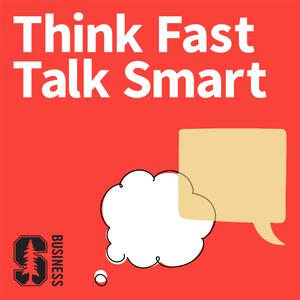 Think Fast, Talk Smart: Communication Techniques
Think Fast, Talk Smart: Communication Techniques
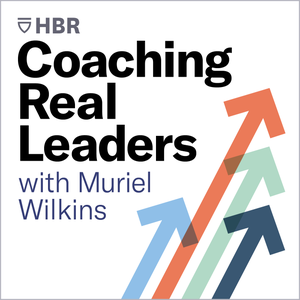 Coaching Real Leaders
Coaching Real Leaders
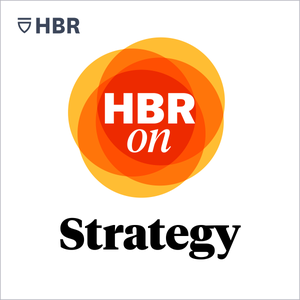 HBR On Strategy
HBR On Strategy
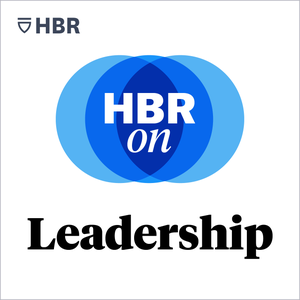 HBR On Leadership
HBR On Leadership
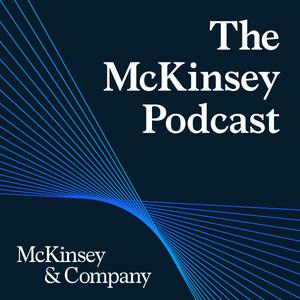 The McKinsey Podcast
The McKinsey Podcast